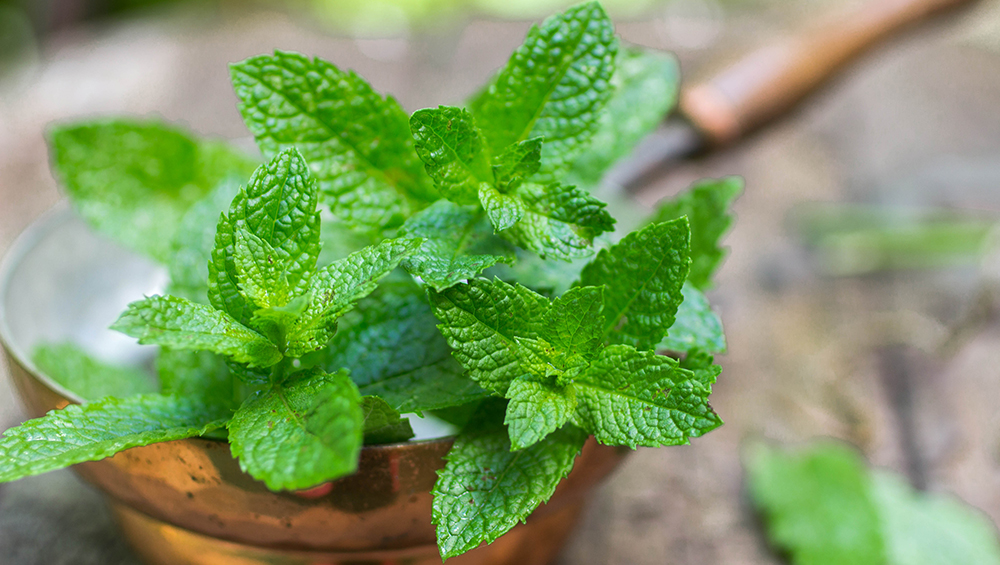5 Ways to Chill Out with this Super Herb
Have you ever noticed that mint ice cream feels colder in your mouth than other flavors? Or that a plain glass of water seems more refreshing if you’ve been chewing mint gum? What’s the hidden secret of mint’s ability to make us feel cool? The answer is a bit surprising. Mint plants contain menthol, a chemical compound that actually tricks your nervous system into thinking things are cooler than they are (the same science is at play when you eat chili peppers that make you feel hot). Basically, the menthol triggers certain nerve cells to tell your brain that things are getting chilly, which can provide welcome relief on hot summer days.
Enjoying the refreshing benefits of mint can be as simple as dropping a few fresh sprigs in a glass of cool water or brewing up a cup of tea. Fresh mint also makes a tasty addition to salads; use in place of fresh parsley for a surprising flavor twist. However, there are plenty of other fun ways to cool down with the wonderful power of mint. Try these ideas!
Make a luxurious minty foot scrub. Here’s the perfect pick-me-up for tired, achy feet. Mix ¼ cup coconut oil, ¼ cup sugar and a few tablespoons of fresh chopped mint until thoroughly combined (use a food processor if you prefer a fine whip). Massage the mixture onto your damp legs and feet while you’re sitting on the edge of the tub, then rinse thoroughly with cool water. You’ll be surprised how soft and refreshed your skin feels afterwards (don’t use while standing in the shower because the coconut oil can make the floor slippery).
Ease the sting of a sunburn. If you’re feeling the effects of too much sun, brew a strong mint tea with either fresh leaves or dried tea bags. Let cool to room temperature or cover and tuck in the back of the fridge. Pour some tea onto a clean washcloth and lay gently over sunburned skin. The menthol provides cooling pain relief and can help reduce inflammation.
Enjoy a refreshing facial toner. Combine equal parts witch hazel and mint tea in a clean glass jar and place it in the refrigerator (about ¼ cup of each since you should discard and make a fresh batch after about a week). Use a cotton ball or gauze pad to apply the toner to your face and neck and you’ll enjoy a fantastic, skin-revitalizing toner for a fraction of the cost of a store-bought concoction.
Whip up some Cucumber-Mint Sauce. Perfect alongside grilled meats or poultry, this sauce is easy to put together. Grate 1 peeled and seeded cucumber and stir into 1 cup of plain yogurt. Season with 2 tablespoons of chopped fresh mint, 1 teaspoon of fresh lemon juice, a pinch of salt, and ¼ teaspoon of ground cumin.
Try some Watermelon-Mint Ice Pops. Consider yourself warned—these 3-ingredient freezer treats are addictive. In a blender, combine 6 cups of seeded watermelon chunks, the juice of 1 lime and ¼ cup fresh mint. Whirl until smooth, then strain through a cheesecloth to remove the solids. Transfer the watermelon liquid into an ice pop mold and freeze according to manufacturer’s instructions.
Mint is a powerhouse herb, prized for its invigorating fragrance as well as its versatility and hardiness. Best of all, it is surprisingly easy to grow. Download this handy PDF for all you need to know about growing your own bumper crop.
How to Grow Your Own Mint
Mint is considered a very easy-to-grow plant that thrives indoors or in hardiness zones 3 to 11 (depending on the variety) with minimal care. However, because the plant spreads by extending its root system, mint can easily overwhelm a garden, crowding out other plants in its path, so most experts recommend keeping it in a container so that it stays manageable. Here’s what else you need to know about growing your own mint.
| If you’re starting with seeds | Sow seeds by gently pressing them into a moistened potting mix in a standard seed tray; transplant into a larger container (at least 8″-12″ wide) when seedlings are 3″-4″ inches tall with good leaf growth. |
| Or using a cutting | Clip a 6″ sprig from a friend’s mint plant, remove all the leaves from the bottom of the stem, and let it sit in a glass of water on your windowsill. After a few weeks, you’ll notice the roots are about 3″-4″ long, which is the ideal time to transplant them to a container filled with potting soil. |
| Keep it indoors | Mint will love growing in the light of a nice sunny window, preferably one that provides afternoon shade. Make sure your pot sits on a saucer as you will need to water frequently. |
| Or in a container outdoors | Make sure your mint doesn’t drape too far over the side of the pot. If it touches the ground, it will start to grow roots and spread. |
| Fertilize and water | Fertilize indoor plants monthly with an organic fertilizer. If you have established plants living outdoors, use a slow-release fertilizer in the spring. Keep soil moist by watering at least a few times a week. |
| When is it ready? | Plants reach maturity in about 2 months, but you can start using the leaves as soon as the plant is established; trimming the leaves will promote more growth. Make sure to remove flower buds, which will slow down leaf production if allowed to grow. |
Growing your own mint is the best way to ensure you always have plenty on hand. For best results, pick mint in the early morning when the plant’s volatile oils make it most flavorful. You can use the mint leaves right away or save them for later use in the refrigerator: Either place the cut ends of the stems in a glass of water or wrap the leaves in a damp paper towel. For longer storage, place the leaves in an ice cube tray, fill with water and freeze.
 Mindful Sodexo
Mindful Sodexo 

0 Comments